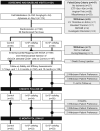Intramyocardial, autologous CD34+ cell therapy for refractory angina
- PMID: 21737787
- PMCID: PMC3190575
- DOI: 10.1161/CIRCRESAHA.111.245993
Intramyocardial, autologous CD34+ cell therapy for refractory angina
Abstract
Rationale: A growing number of patients with coronary disease have refractory angina. Preclinical and early-phase clinical data suggest that intramyocardial injection of autologous CD34+ cells can improve myocardial perfusion and function.
Objective: Evaluate the safety and bioactivity of intramyocardial injections of autologous CD34+ cells in patients with refractory angina who have exhausted all other treatment options.
Methods and results: In this prospective, double-blind, randomized, phase II study (ClinicalTrials.gov identifier: NCT00300053), 167 patients with refractory angina received 1 of 2 doses (1×10(5) or 5×10(5) cells/kg) of mobilized autologous CD34+ cells or an equal volume of diluent (placebo). Treatment was distributed into 10 sites of ischemic, viable myocardium with a NOGA mapping injection catheter. The primary outcome measure was weekly angina frequency 6 months after treatment. Weekly angina frequency was significantly lower in the low-dose group than in placebo-treated patients at both 6 months (6.8±1.1 versus 10.9±1.2, P=0.020) and 12 months (6.3±1.2 versus 11.0±1.2, P=0.035); measurements in the high-dose group were also lower, but not significantly. Similarly, improvement in exercise tolerance was significantly greater in low-dose patients than in placebo-treated patients (6 months: 139±151 versus 69±122 seconds, P=0.014; 12 months: 140±171 versus 58±146 seconds, P=0.017) and greater, but not significantly, in the high-dose group. During cell mobilization and collection, 4.6% of patients had cardiac enzyme elevations consistent with non-ST segment elevation myocardial infarction. Mortality at 12 months was 5.4% in the placebo-treatment group with no deaths among cell-treated patients.
Conclusions: Patients with refractory angina who received intramyocardial injections of autologous CD34+ cells (10(5) cells/kg) experienced significant improvements in angina frequency and exercise tolerance. The cell-mobilization and -collection procedures were associated with cardiac enzyme elevations, which will be addressed in future studies.
Figures



Comment in
-
CD34+ autologous human stem cells in treating refractory angina.Circ Res. 2011 Aug 5;109(4):351-2. doi: 10.1161/CIRCRESAHA.111.250696. Circ Res. 2011. PMID: 21817161 No abstract available.
References
-
- Mannheimer C, Camici P, Chester MR, Collins A, DeJongste M, Eliasson T, Follath F, Hellemans I, Herlitz J, Luscher T, Pasic M, Thelle D. The problem of chronic refractory angina: report from the esc joint study group on the treatment of refractory angina. Eur Heart J. 2002;23:355–370. - PubMed
-
- Jolicoeur EM, Granger CB, Henry TD, Holmes DJ, Pepine CJ, Mark D, Chaitman BR, Gersh BJ, Ohman EM. Clinical and research issues regarding chronic advanced coronary artery disease: part i. Contemporary and emerging therapies. Am Heart J. 2008;155:418–434. - PubMed
-
- Jolicoeur EM, Ohman EM, Temple R, Stockbridge N, Smith S, Mark D, Califf RM, Henry TD, Chaitman BR, Granger CB. Clinical and research issues regarding chronic advanced coronary artery disease: part ii. Trial design, outcomes, and regulatory issues. Am Heart J. 2008;155:435–444. - PubMed
-
- Lloyd-Jones D, Adams RJ, Brown TM, Carnethon M, Dai S, De Simone G, Ferguson TB, Ford E, Furie K, Gillespie C, Go A, Greenlund K, Haase N, Hailpern S, Ho PM, Howard V, Kissela B, Kittner S, Lackland D, Lisabeth L, Marelli A, McDermott MM, Meigs J, Mozaffarian D, Mussolino M, Nichol G, Roger VL, Rosamond W, Sacco R, Sorlie P, Thom T, Wasserthiel-Smoller S, Wong ND, Wylie-Rosett J. Heart disease and stroke statistics—2010 update: a report from the American Heart Association. Circulation. 2010;121:e46–e215. - PubMed
Publication types
MeSH terms
Substances
Associated data
Grants and funding
LinkOut - more resources
Full Text Sources
Other Literature Sources
Medical

